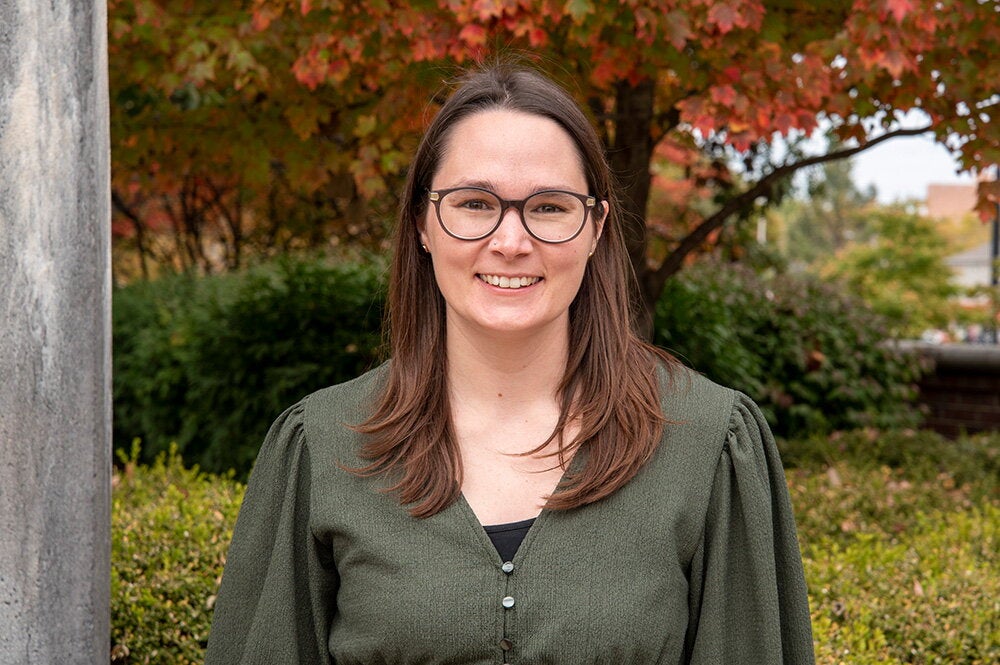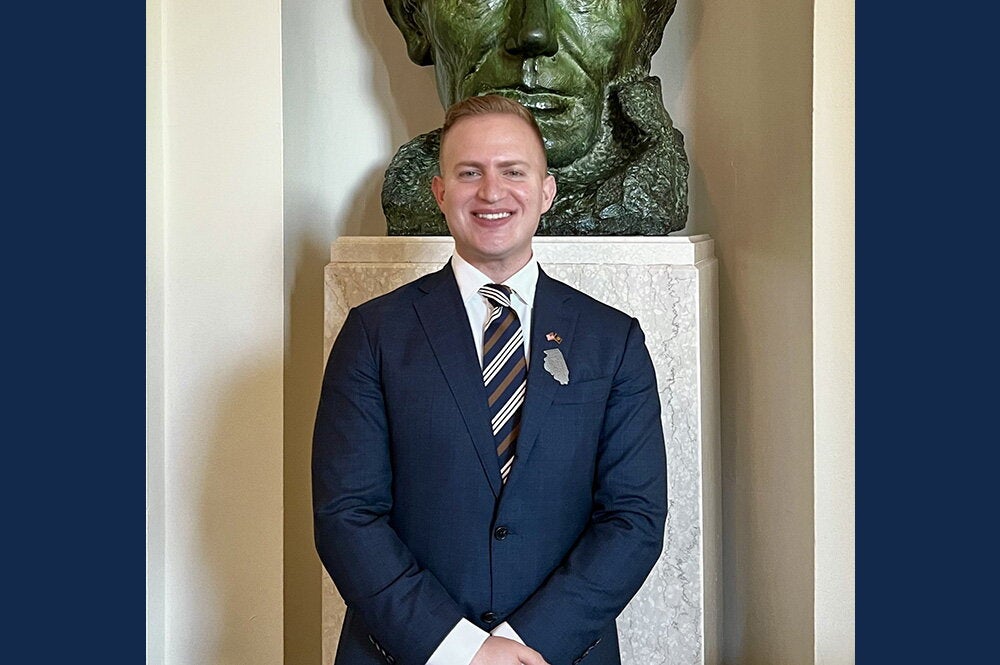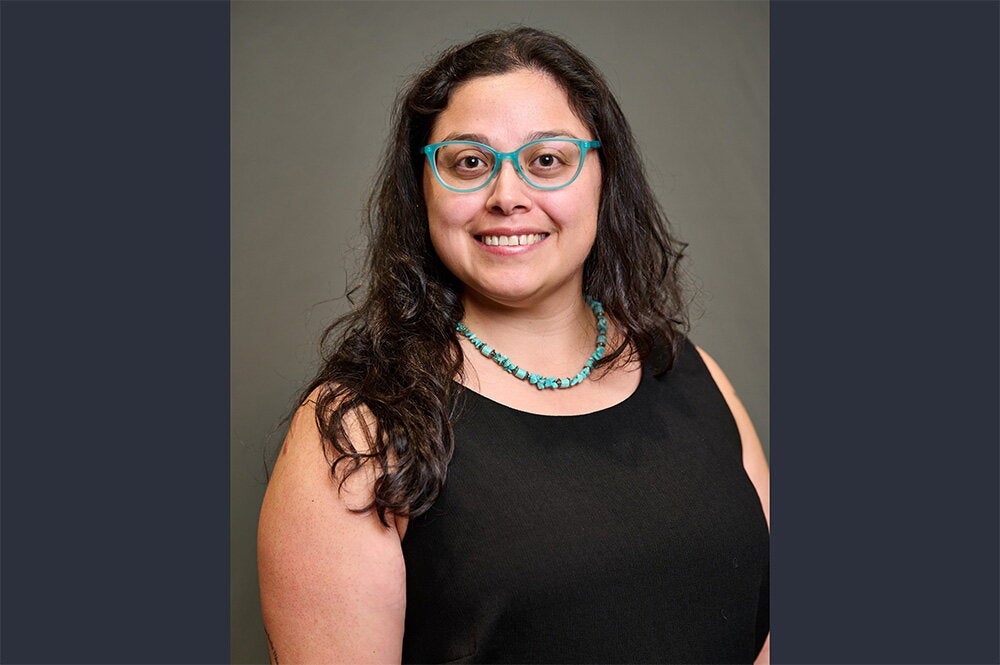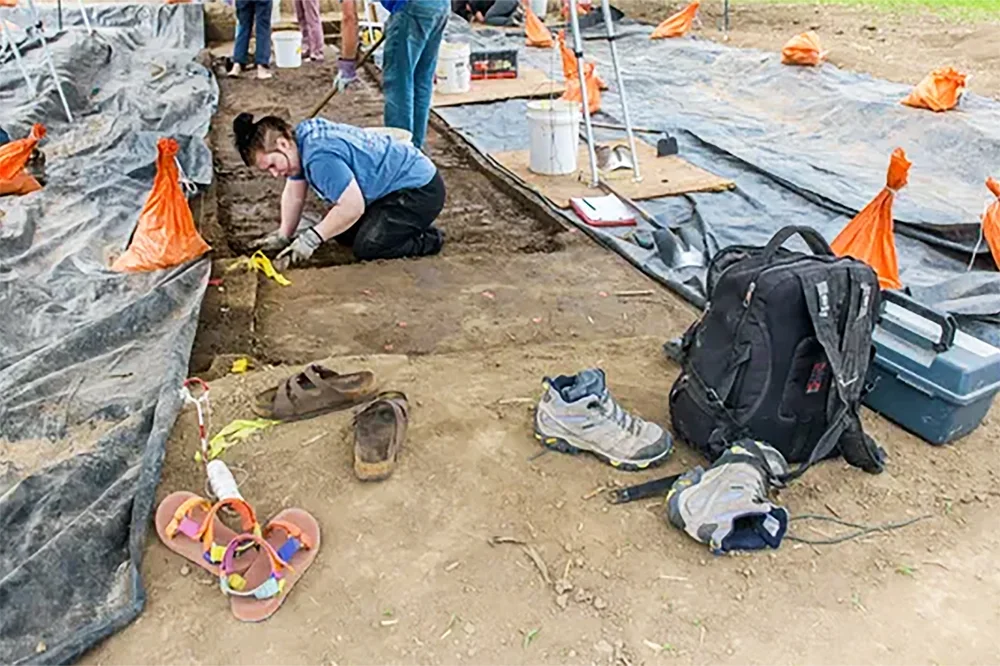
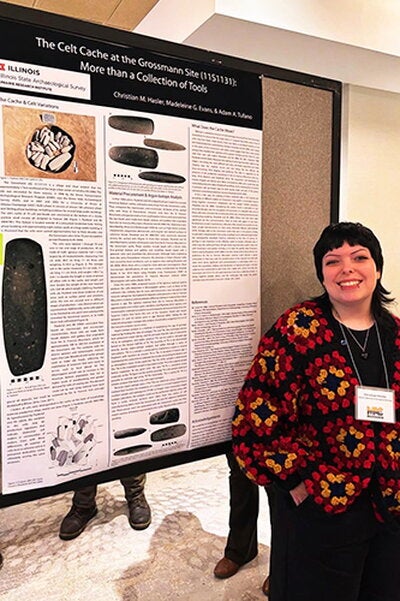
Christian Hasler (BA, ’22, anthropology) had dreams of working abroad in an archaeological field.
Egypt, maybe. Certainly international. Somewhere with a storied history.
However, she found that her own home state has a rich history waiting for investigation.
Hasler is a scientific specialist of archaeology (or a lithic analyst) in the Special Projects Department at the Illinois State Archaeological Survey. While a student at Parkland College then within the College of LAS, she focused her studies in archaeology with a minor in history.
Briefly describe a typical workday. Also, what is an example of the most interesting aspect of your job?
In a typical workday, I work at the Nuclear Physics Laboratory on campus with Madeleine Evans—the Senior Lithic Analyst at ISAS. We work primarily on one excavated Illinois Department of Transportation (IDOT) site at a time. ISAS is funded mainly through IDOT, and we are contracted to survey roads, bridges, or other IDOT projects ahead of their work to ensure that no cultural material will be affected. There is quite a backlog of large collections from sites that have not been analyzed or reported, so that’s what the Special Projects section at ISAS focuses on. Madeleine and I analyze the lithic assemblage (stone tools such as points, axes, hammerstones, celts, etc.) of a site, inventory the artifacts, and write/publish a report that will be incorporated into a larger holistic site report with the archaebotany, ceramics, and other sections. On typical days, I am either examining artifacts or writing/editing a report for them. Occasionally, I am enlisted to help with field work from our Central Illinois Field Station (CIFS) to do IDOT contracted survey work (mainly shovel testing and pedestrian surveys near roadways) or geophysical work (LIDAR, EMI, etc.) with Bob McCullough, the head of Special Projects. I would say the most interesting aspect of my job is getting to see and analyze artifacts (for example: the celts from the Grossmann Site cache—one of the largest celt caches) and having the opportunity to work on sites in the field, whether by helping a field station or doing geophysical work.
In hindsight, what about college best prepared you for your life and career?
Field school! I actually attended two field schools—one short course at Parkland College and one longer course at Illinois. At Parkland in 2019, we surveyed the Lost Garden at Allerton Park & Retreat Center and focused mostly on mapping with total stations and doing research on the area and Robert Allerton himself. At Illinois in 2021, we excavated an area of Sapelo Island, Ga., to learn more about subsistence practices of past indigenous encampments and focused more on excavation techniques. The Sapelo Island field school in particular gave me a great reference for Cultural Resource Management (CRM) work—such as shovel testing—which I did at ISAS when I started in 2022 as an Archaeological Field Technician with CIFS, and still do occasionally when extra help is needed.
How did your major prepare you for life following graduation?
As an anthropology major, I took several courses that challenged the way I thought or beliefs I held. I was taught new ways of examining events, stories, and history, and I found that invaluable following graduation in my life and career. It helped prepare me to think more critically and outside-the-box, which is often needed in life!
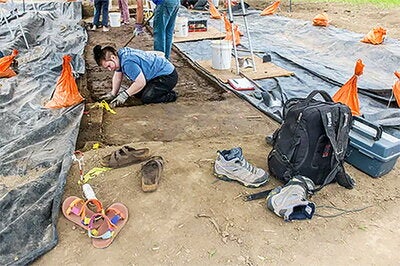
What do you enjoy most about your work? What part of your work aligns with your personal values?
As someone who was born and raised in this area, I really enjoy getting to discover more of my own state’s history. I always wanted to be an archaeologist, but pictured working in Egypt as that is how I found the field. Honestly, that was still my plan for most of my college career until I learned about ISAS through my professors and TAs at Illinois. I had never stopped to consider the plethora of history right in my own state. Although I will always love ancient Egypt and international archaeology, I have a profound sense of pride in getting the opportunity to continue archaeological investigations where I grew up.
There is a large focus on tribal relations at ISAS, which I find incredibly important. It is no secret that this cultural material and land of Illinois is primarily indigenous first and foremost, and I wouldn’t feel comfortable working for an organization that didn’t acknowledge that and work with tribes to ensure we are as respectful as possible. I aim to be part of this ongoing work with tribes and make sure they have a voice in their cultural material and history, and I believe ISAS is a great organization to continue that.
Is there anything you’d like to add about your work?
There is so much work within the field of anthropology and even just within the subfield of archaeology. There is always more to discover and learn. All over the country and the world there are opportunities to help with excavation, research, curation, and more. If anyone is interested in this field in any way, I highly suggested looking into it—whether in your area or abroad. It is a wonderful way to learn more about human history and how we got to where we are today.
Editor's note: This is part of a series that features College of LAS alumni and their careers. Visit here to read more.
